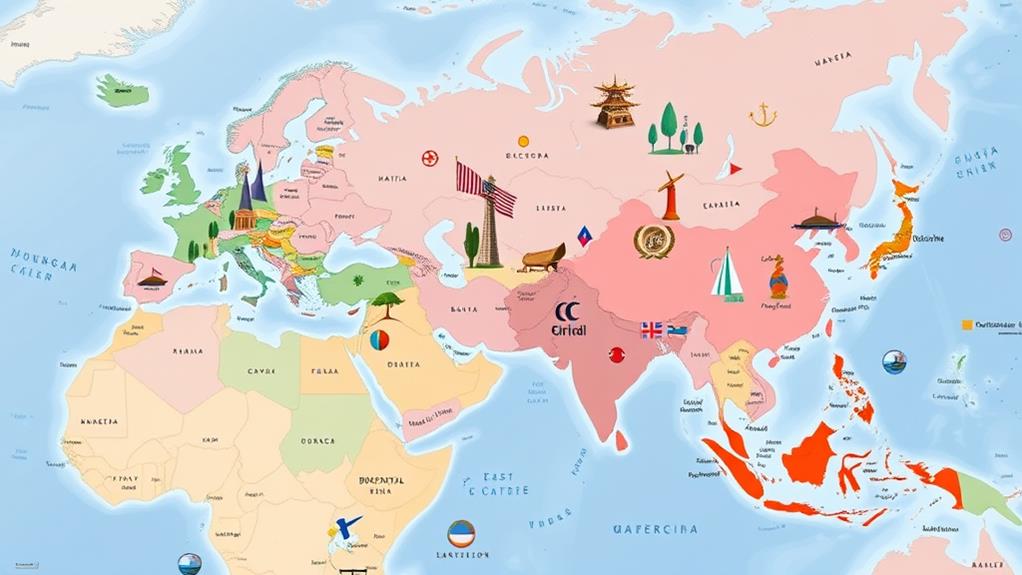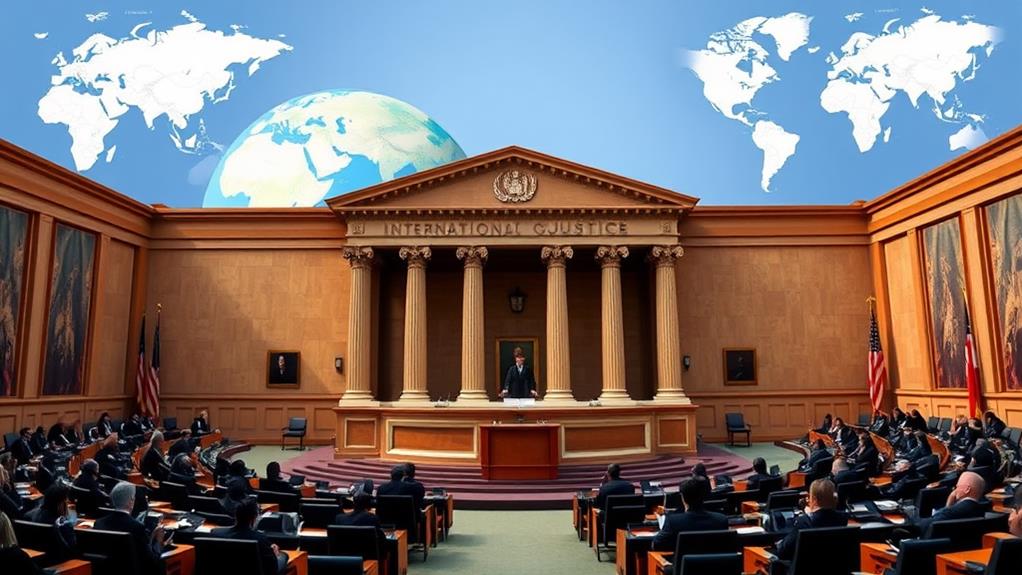International law plays a vital role in resolving territorial disputes by promoting peaceful negotiations over military aggression.
Historical grievances, cultural significance, and economic interests often fuel territorial disputes. However, international law provides frameworks to address these disputes. The United Nations Charter prohibits the use of force against territorial integrity, ensuring that countries prioritize diplomacy over aggression.
The International Court of Justice (ICJ) serves as a key platform for dispute resolution. Arbitration offers a flexible and confidential process, allowing countries to resolve disputes without resorting to violence.
ICJ decisions provide binding resolutions that encourage compliance, as they are legally binding and widely recognized.
Although challenges like mistrust and conflicting interests arise, international law's emphasis on non-aggression and legal principles helps navigate these complexities.
By adhering to these principles, countries can foster global stability and peaceful coexistence.
Causes of Territorial Disputes

Causes of Territorial Disputes
Territorial disputes arise from a complex mix of historical, cultural, and economic factors. These factors often combine to create tensions between states claiming sovereignty over the same land. Historical grievances, conflicting national interests, and ambiguous borders are common causes of territorial disputes.
Historical reasons are particularly contentious. They often involve long-standing claims and a deep sense of national identity. For example, disputes over territories that were once part of empires or colonies can persist for centuries, fueled by memories of past injustices or glories.
The Israeli-Palestinian conflict, for instance, has its roots in the early 20th century when the British government promised to create a Jewish homeland in Palestine, leading to ongoing disputes over territory and sovereignty.
Cultural factors also play a significant role. Territories may hold religious, ethnic, or linguistic significance to the disputing parties. The Kashmir dispute between India, Pakistan, and China, for example, involves not only territorial claims but also cultural and religious identities.
Economic interests are another driving force behind territorial disputes. Control over territories rich in natural resources, such as oil, gas, or fertile land, can be a powerful motivator for states to engage in disputes. The Spratly Islands dispute in the South China Sea, for instance, involves claims by several countries, including China, Vietnam, and the Philippines, due to the area's rich oil and gas reserves.
Understanding these underlying causes is crucial for developing effective strategies for conflict resolution. It allows for targeted diplomatic efforts and the application of relevant international law principles to find peaceful solutions.
Role of International Law
International Law Resolves Territorial Disputes
International law plays a crucial role in resolving territorial disputes by promoting peaceful negotiations and diplomacy over military aggression. The United Nations Charter prohibits the use of force against the territorial integrity or political independence of any state. This emphasis on non-violent conflict resolution is essential, as historical instances like the Bataan Death March demonstrate the devastating consequences of disregarding international principles.
Resolving Territorial Disputes Through International Law
When states are embroiled in territorial disputes, international law offers several avenues for resolution. The International Court of Justice (ICJ) serves as a critical platform for the peaceful adjudication of such disputes. States can voluntarily submit their cases to the ICJ, which provides a binding legal opinion based on international law.
For instance, in 2002, the ICJ resolved a territorial dispute between Bahrain and Qatar, providing a peaceful resolution to the conflict.
Arbitration: A Flexible and Confidential Process
Arbitration is another effective mechanism for resolving territorial disputes. Institutions like the Permanent Court of Arbitration facilitate these processes, helping states reach mutually acceptable solutions. This approach offers a more flexible and confidential process compared to the formal proceedings of the ICJ.
For example, in 2016, the Permanent Court of Arbitration helped resolve a territorial dispute between the Philippines and China in the South China Sea.
Promoting Peaceful Coexistence
Mechanisms for Conflict Resolution

Resolving Territorial Disputes: Mechanisms and Principles
The Importance of Conflict Resolution
Historical events, such as the Bataan Death March, demonstrate the devastating consequences of unresolved conflicts.
Adhering to international legal standards is crucial to avoid similar tragedies.
International Court of Justice (ICJ)
The ICJ is a key mechanism for resolving territorial disputes.
States can voluntarily submit their cases to the ICJ, which has adjudicated numerous disputes over the years.
Although ICJ decisions aren't always binding in practice, they carry significant legal weight.
Arbitration
Arbitration is another option for resolving disputes.
The Permanent Court of Arbitration (PCA) in The Hague facilitates arbitration processes, allowing states to resolve disputes through an impartial third party or tribunal.
Arbitration can be more flexible and confidential than ICJ proceedings.
Principle of Non-Aggression
International law emphasizes the principle of non-aggression, which encourages states to refrain from the threat or use of force when resolving territorial disputes.
This principle is enshrined in the United Nations Charter, promoting peaceful negotiations and diplomacy.
How Does International Law Address Issues Related to Exclusive Economic Zones (EEZ) and Territorial Disputes?
International law plays a crucial role in defining rights and responsibilities in eez and addressing territorial disputes. The United Nations Convention on the Law of the Sea sets out guidelines for the use of EEZ and provides a framework for resolving conflicts. States have a duty to uphold these international laws to avoid disputes and promote peaceful cooperation.
Challenges in Dispute Resolution
Challenges in Resolving Territorial Disputes
Resolving territorial disputes is a complex process, often hindered by deep-seated historical grievances, conflicting national interests, and ambiguous borders. These complexities can lead to entrenched positions and a reluctance to compromise, making the resolution process arduous.
Historical Grievances
Reinforce animosity and mistrust. For instance, the Israel-Palestine conflict has its roots in historical grievances, making it challenging to find a resolution.
Conflicting National Interests
Prioritize state sovereignty over cooperation. The border disputes between India and Pakistan are a prime example, where both countries prioritize their national interests over cooperation.
Ambiguous Borders
Foster disputes over resource-rich areas. The Bakassi Peninsula dispute between Nigeria and Cameroon is a classic example of a territorial dispute fueled by ambiguous borders and resource competition.
The Need for a Robust Framework
A robust and adaptable framework for dispute resolution is essential to address these challenges. International law mechanisms, such as the International Court of Justice (ICJ) and arbitration, can facilitate the resolution process.
However, some states may reject judicial adjudication or dispute the applicability of certain legal principles, further complicating the process.
Effective Resolution
Requires a commitment to principles like non-aggression and judicial adjudication, ensuring that the rights and interests of all parties are considered. Decisions should be based on a clear and coherent application of international law.
Impact of ICJ Jurisprudence

The International Court of Justice (ICJ) has played a crucial role in shaping the legal landscape of territorial disputes.
The ICJ's decisions have formulated an approach to pre-colonial and colonial title, maintaining territorial stability and setting the stage for the right to self-determination. For instance, in cases like the Temple of Preah Vihear and Sovereignty over Certain Frontier Land, the ICJ has demonstrated its ability to independently resolve issues of sovereignty and border disputes, emphasizing the importance of treaty law and the principle of uti possidetis.
The ICJ's commitment to upholding justice and stability in international relations is evident in its role in addressing complex historical grievances. This commitment is seen in its ability to address colonial histories, which often parallel the struggles faced by nations in asserting their sovereignty and identity.
The impact of ICJ's jurisprudence extends beyond individual cases, contributing to the development of institutional law and the principles of international law. The Court's emphasis on stability of territorial arrangements has helped in preventing conflicts and promoting peaceful resolution.
Moreover, the ICJ's binding judgments have shown to be more effective in ending disputes compared to non-binding methods like mediation, as they provide domestic political cover and reputational costs for non-compliance. This approach underscores the ICJ's role in bridging the gap between legal and political considerations, ensuring that decisions are grounded in law rather than purely political factors, thus maintaining the legitimacy and authority of the international legal regime.
Questions and Answers
How Do Historical Borders Influence Current Territorial Disputes?
Historical borders play a significant role in shaping current territorial disputes. This is because they often evoke strong claims of historical ownership, which can make compromise difficult.
For example, disputes over Taiwan, Jerusalem, and the Falkland Islands persist due to such historical assertions. These claims are rooted in historical precedents and perceived legitimacy, which can mobilize domestic support and create grievances that fuel ongoing tensions.
Can Arbitration Decisions Be Appealed or Overturned?
Arbitration decisions are generally final, but they can be appealed or overturned under specific circumstances.
If you suspect that the arbitration process was compromised, you may have grounds for appeal. For instance, if you believe that the arbitrators were corrupt, showed evident partiality, or engaged in misconduct, you can take the matter to court.
Additionally, if the arbitrators exceeded their powers or manifestly disregarded the law, you have a basis for appeal.
The grounds for appeal are strict, and the courts will confirm the arbitration award unless one of these conditions is met.
What Role Does Public Opinion Play in Territorial Dispute Resolution?
Public Opinion Influences Territorial Dispute Resolution
In territorial disputes, public opinion plays a significant role by shaping policy preferences and acceptance of resolutions.
People's beliefs about territorial ownership, often driven by historical ownership or ethnic ties, can harden bargaining stances and make compromise difficult. For instance, a country's citizens may strongly believe that a disputed territory has historically belonged to them, making it challenging for their leaders to negotiate a compromise.
Leaders may leverage public opinion to strengthen their positions in territorial disputes.
However, international adjudication can help mitigate emotional fallout and increase support for concessions. This can be a delicate balance, as leaders must navigate between pleasing their citizens and finding a resolution that's acceptable to all parties involved.
How Effective Is International Law in Preventing Future Conflicts?
International law is essential in preventing future conflicts by establishing clear rules and standards for nations to follow. This framework helps limit the use of violence and promotes peaceful dispute resolution.
For instance, international humanitarian law and human rights law set principles to protect civilians and prevent human suffering during conflicts.
However, the effectiveness of international law depends on enforcement and political will. A notable example is the challenge of implementing United Nations Security Council Resolution 1325, which aims to increase women's participation in conflict resolution and peacebuilding.
Stronger enforcement of international law is crucial to safeguard peace.
Are There Cases Where States Have Rejected ICJ Decisions?
States have rejected ICJ decisions in the past.
One notable example is the _Nicaragua v. United States_ case, where the ICJ ruled against the United States on several counts. In response, the United States ignored the judgment and vetoed measures of implementation sought by Nicaragua at the Security Council.
Another instance is Israel's rejection of the ICJ's advisory opinion on the legality of its wall in the Occupied Palestinian Territories.
These cases highlight the challenges in enforcing ICJ decisions.